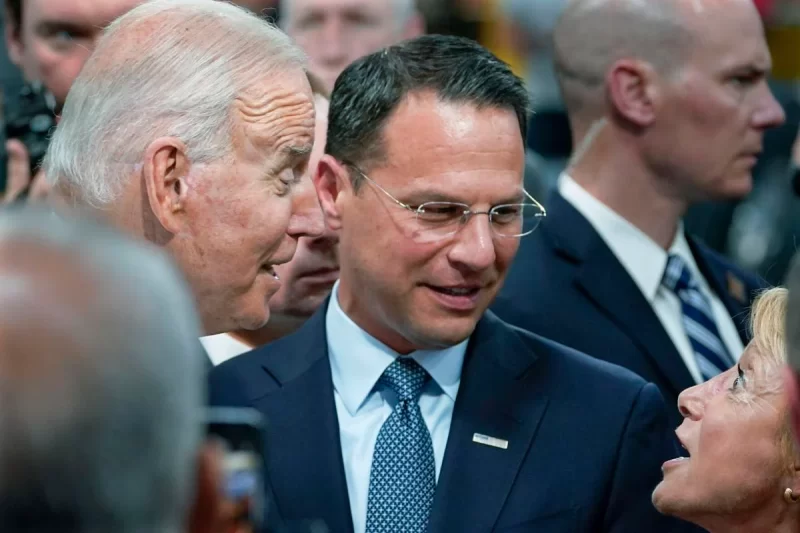By Anthony Hennen | The Center Square
(The Center Square) – The 2022 midterm elections gave Pennsylvania another Democratic governor, turned its U.S. Senate representation blue, and may turn the Pennsylvania House over to Democratic leadership.
The Republican Party placed risky bets to win, but they did not pay off. Political power, and the voters who drive it, swung away from the GOP this midterm.
Democratic Lt. Gov. John Fetterman will soon join Democratic Sen. Bob Casey in the U.S. Senate, having won election to follow the retiring Republican Sen. Pat Toomey. Fetterman’s win came against Republican Dr. Mehmet Oz, who struggled to overcome low favorability numbers and the baggage of being a recent resident in New Jersey.
Democrat Josh Shapiro, too, will keep the party in control of the governor’s mansion. He easily triumphed over Republican state Sen. Doug Mastriano to replace Gov. Tom Wolf, who is term-limited.
As of 3 p.m. Wednesday, some analysts gave Democrats a 75% chance of gaining control of the Pennsylvania House as well. House Democrats have already claimed they’ve won it, though the race has yet to be called by any media outlets.
In another setback to Republicans on Wednesday afternoon, NBC News has projected that incumbent Democrat Susan Wild will remain in the U.S. House as the representative of Pennsylvania’s 7th District. Wild faced Republican Lisa Scheller in an expensive rematch of their 2020 race.
Though the Democrats have seen significant success across Pennsylvania, experts warned not to interpret the results as the commonwealth turning into a Democratic stronghold.
“I’m always cautious in midterms to say it’s not super predictive of the future,” said Sam Chen, a professor of political science at Northampton Community College and host of the talk show news journal Face the Issues. “I don’t think this means Pennsylvania is blue … I don’t think we can write it off and say this is now a Democrat state.”
Instead, Chen looks to the political history of Pennsylvania and voter habits of split-ticket voting instead of partisan allegiance to explain it. What he sees is a tendency to elect leaders who diverge from party discipline.
Sen. Toomey (whom Chen served under as a Congressional aide) “works across the aisle on guns, votes to convict President Trump during the impeachment trial,” Chen noted, and Sen. Casey “who is known as a stand-in-the-middle, moderate kind of guy.” Even former Sen. Rick Santorum, with a reputation as a strong social conservative, “worked very closely with labor unions throughout the state,” Chen said.
“When you put someone like a Doug Mastriano up, it’s not the kind of candidate the state gravitates toward,” Chen said. “I don’t know that we can draw conclusions yet about what the state will look like.”
Pro-business groups and energy producers have struck a pragmatic tone, speaking of collaboration and possibilities instead of focusing on any political differences they may have with new leaders like Shapiro.
“We eagerly anticipate partnering with the new administration to achieve a vital, globally competitive Pennsylvania where all people thrive,” the Greater Pittsburgh Chamber of Commerce said in a statement. “We are very encouraged by the governor-elect’s commitment to serve as Pennsylvania’s chief salesperson, and we are at the ready to actively engage with the administration in economic development initiatives.”
For the natural gas industry, it looks to work with Shapiro on issues like taxation, regulation, and economic growth.
“Voters want the affordable, reliable, clean energy natural gas delivers, and they support more natural gas production and infrastructure to create jobs, provide new manufacturing opportunities, and secure greater environmental progress,” Marcellus Shale Coalition President David Callahan said in a statement to The Center Square. “Energy and natural gas are unifying areas of common ground and we look forward to working with all the newly elected state and federal officials to further unlock the commonwealth’s energy resources and ensure Pennsylvania’s policies are attractive for energy investment and jobs.”
Regardless of a pragmatic spirit that may be less polarizing than in other states, Pennsylvania’s reputation as a swing state could change due to population changes and economic stagnation.
As higher-income and suburban/urban voters have shifted to the Democratic Party, and lower-income and rural voters have shifted to the Republican Party, those trends favor Democratic control in Pennsylvania. One pollster noted, as The Center Square previously reported, that states with a bigger metropolitan vote gives Democrats a greater potential to win.
